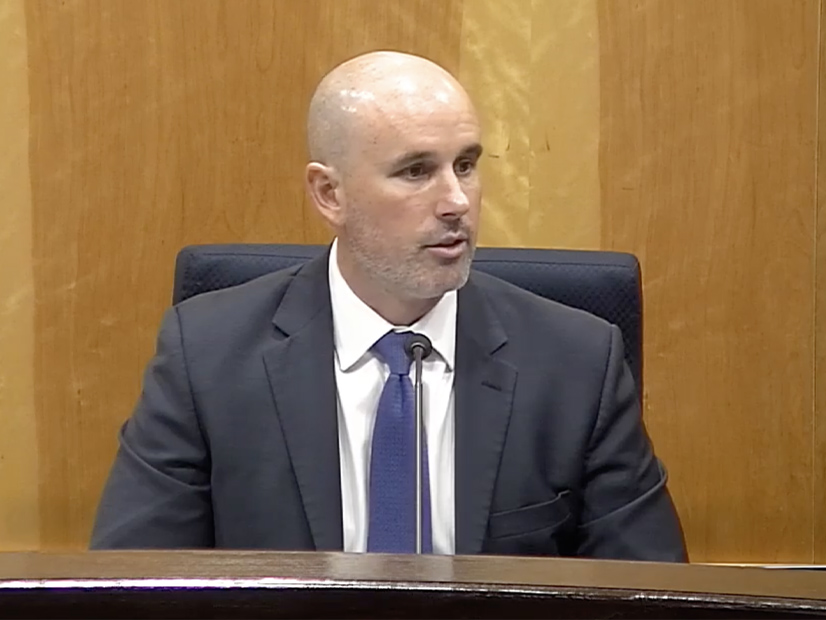Texas regulators last week celebrated the closure of the first phase of their blueprint for reliability reforms to the ERCOT grid, cautioning that it’s only a first step.
The Public Utility Commission closed two dockets during its Feb. 1 open meeting, 52373 and 53298. The former encompassed initial revisions to the market design, and the latter covered the development of a firm-fuel supply service.
“The ERCOT grid is more reliable than it’s ever been, and getting to this point has been a total team effort,” PUC Chair Thomas Gleeson said in a statement, thanking ERCOT staff, industry stakeholders and lawmakers. “This doesn’t mean we’re done improving the grid. We’re just closing the book on this first chapter.”
A result of legislation passed after the devastating 2021 winter storm, the first phase reforms included two expansions of the PUC’s weatherization rules, requirements for generators to secure backup fuel supplies’ new consumer protection measures and market changes that focused on price stability and reliability.
In a memo, commission staff said modifications to the operating reserve demand curve, emergency response service reforms, and development of fast frequency response service and ERCOT contingency reserve service have been completed.
They recommended new projects be opened for a firm-fuel product and voltage support compensation. Two other projects are in progress: demand response and setting higher performance standards for energy efficiency programs. The PUC already has received approval for three positions to manage the latter project.
Commissioner Jimmy Glotfelty said he supported the voltage-support docket.
“This is becoming more and more an issue as we have more inverter-based resources. This might be an issue that we need to address in the future, and it’d be good to get positions on it.”
Meanwhile, several Phase 2 projects already are running full bore.
The commission reacted positively to staff’s suggestion that the interim value of lost load (VoLL) that will be used in ERCOT’s reliability standard be set at $25,000/MWh and that any study using the metric as an input conduct sensitivity analysis, varying VoLL between $20,000/MWh and $70,000/MWh (55837).
VoLL was reduced to $5,000/MWh from $9,000/MWh and decoupled from the system-wide offer cap after high prices during the winter storm. According to the grid operator’s market monitor, the $9,000 cap resulted in $16 billion of incorrectly priced market transactions during the storm. Staff noted that Potomac Economics said in its 2022 state-of-the-market report that the $5,000 value “likely underestimates VoLL by a substantial amount.”
Staff carefully reiterated the interim VoLL value is for study purposes only and will not affect consumers’ cost of electricity. The Brattle Group is beginning a survey of ERCOT retail customers in March to determine their value of lost load. (See “VoLL Study to Begin,” Texas PUC Sends ESR Change back to ERCOT.)
Staff also presented a draft scoping document for a review of ancillary services, as required under the Public Utility Regulatory Act. The review’s report, a collaborative effort with ERCOT and Potomac Economics, is due to the PUC in September (55845).
Protocol Changes Approved
The commission also approved nine protocol changes approved by ERCOT’s Board of Directors, but not before probing one revision (NPRR1181) that requires qualified scheduling entities to notify the grid operator when inventories drop to critical levels (55445).
“These are things that ERCOT wants to know, but these are not critical for market operations,” Glotfelty said. “It’s the individual generator’s responsibility to know how much coal they have, how much energy they have. … I think this is kind of an overreach, quite frankly.”
Dan Woodfin, ERCOT’s vice president of system operations, agreed the NPRR isn’t needed for market operations. He reminded commissioners that as the region’s reliability coordinator, the grid operator needs situational awareness of future reliability risks.
“If we’ve got a plant that has coal, they’re running out of coal or maybe some rail issue or something, we shouldn’t be approving transmission outages that depend on one or more of those units at that plant being available,” he said. “That’s something where that information is critical to us to be able to make good decisions and avoid reliability problems.”
Gleeson Chairs 1st Meeting
The meeting marked Gleeson’s first as PUC chair. He was appointed to the position by Gov. Greg Abbott (R) last month. (See Abbott Names PUC Executive Director as Chair.)
“I’ve spent almost my entire professional career at this agency. I’ll be honest, when I started here 15 years ago, this was definitely not something I saw in my career plan,” he said.
Gleeson had been the PUC’s executive director since December 2020. He replaces Kathleen Jackson, who was named interim chair when Peter Lake resigned last June.
“We’re proud to have you up here with us,” Glotfelty said. “We’re excited to see you move from representing the entirety of the staff to representing the entirety of all of the people in the state, and we know you’ll do a great job each and every way.”
“It’s quite the transition to having about four people in my office to 240 people,” Gleeson said.
Following a brief executive session, the commissioners approved the appointment of Connie Corona, the PUC’s deputy executive director, as interim executive director. Corona first joined the commission in 1997, returning in 2017 after a 14-year stint in NRG Energy’s regulatory affairs group.
The commissioners also agreed to request the state legislative board set their salaries at $225,000 for the remainder of the 2024 fiscal year and at $230,000 for 2025. The request will include setting the executive director’s salary at $245,559 for the remainder of 2024 and $257,858 for the 2025 fiscal year.


